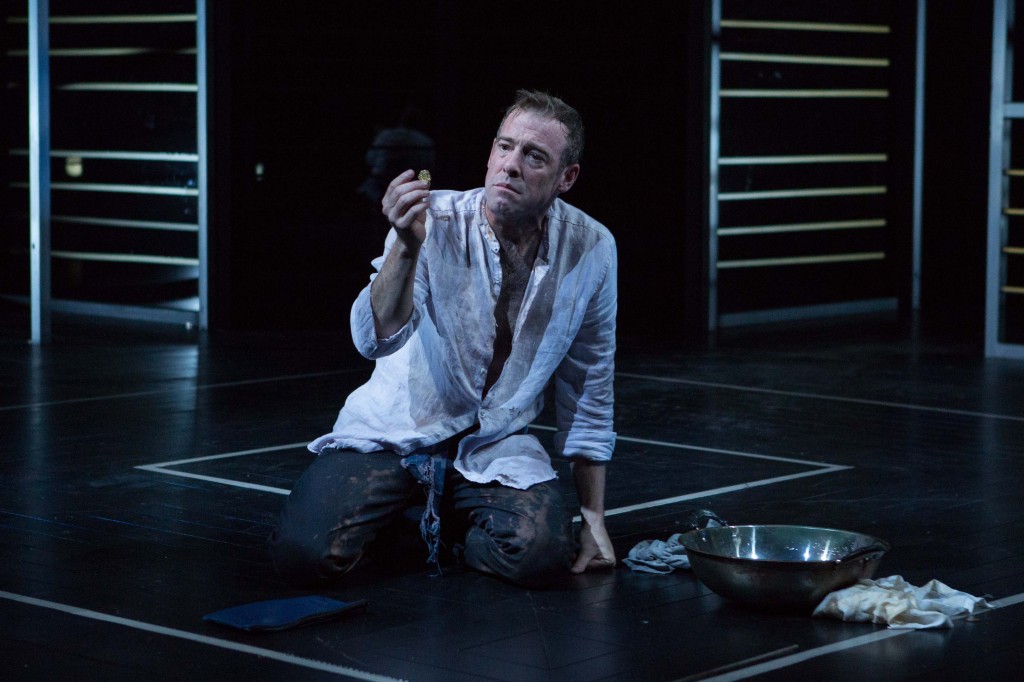 Ian Merrill Peakes begins and ends his role as “Timon of Athens” standing in the center of Folger Shakespeare Theatre’s stage. At the start, he’s basking in his glory as a prosperous master of the universe, happily dispersing his gold; in the end he’s alone, torn down, penniless emotionally, at the mercy of gods, or fate, or something quite different than the riches that once defined him.
Ian Merrill Peakes begins and ends his role as “Timon of Athens” standing in the center of Folger Shakespeare Theatre’s stage. At the start, he’s basking in his glory as a prosperous master of the universe, happily dispersing his gold; in the end he’s alone, torn down, penniless emotionally, at the mercy of gods, or fate, or something quite different than the riches that once defined him.
Waylaid by the indifference of those who once flocked around him, he’s intent on destroying the world for spite, the ultimate misanthrope.
He’s so extreme, the play has sometimes been interpreted as a satire; some say it eschews the other easy categories for Shakespearian plays – comedy, history, tragedy – and instead is considered one of his “problem plays.”
There are indications that the play may have had a co-author (likely Thomas Middleton), or may even have been unfinished. There is no record of it having been performed in Shakespeare’s lifetime – and only scant productions of it since then, compared to some of his other works that are in constant rotation (the last “Timon” in Washington was about 17 years ago).
We look to places like Folger, however, to examine every one of Bard’s works over time, and this one is the result of deep consideration, terrific stagecraft and strong acting.
Robert Richmond has directed the rarely-produced play as a contemporary cautionary tale at a time when gilded leaders may be at their most excessive and dangerous. In this world, the superrich giving away large sums of money isn’t heartfelt or even asked for, but is a showy way of demonstrating largesse.
And certainly, throwing around the gold so freely brings the people around. In the party that begins the work, each guest is run through facial recognition and identified on screens above, which becomes a handy guide for the audience to keeping straight the cast of nearly a dozen. It is through the video screens, too that we see the transfer of large sums, as if Bitcoin or some other electronic transfer, going to each hanger-on -the painter (Andhy Mendez), the poet (Michael Dix Thomas), the merchant (Kathryn Tkel), the jeweler (Sean Fri) and so forth.
The only one not clamoring for the gold is the philosopher Apemantus (Eric Hissom), who with some panache tells of more important things.
It isn’t until the money is gone that Timon begins to hear him, though. In a spectacular scene, Timon invites his fair-weather recipients of his excess to his home to rebuke them with a revenge that could only be more shocking if it also had an olfactory element. Then he doesn’t want to help people at all, even if he could. Instead, he does all he can to insure they be wiped out.
There is no happy ending, no moral at the end, not even rhymed couplets one might have expected. But that’s the blunt power of a cautionary tale that isn’t eased when one walks out into the Washington night, a block from the Capitol.
Peakes’ performance is a marvel, he’s working with an intensity that’s on high from start to finish and is at the center of every scene. One hope he gets his heart rate checked at the end of every performance to make sure he doesn’t expire in a rage right on the boards. The support cast is often just as inspired, with Antoinette Robinson’s emotional Flavius and Maboud Ebrahimzadeh’s thoughtful soldier Alcibiades among the standouts.
The modern set by Tony Cisek, festooned with lights by Andrew F. Griffin and those projections by Francesca Talenti are enhanced by Matt Otto’s sound design, where escalating drama is accompanied by unsettling waves of noise.
“Timon of Athens” may not top anyone’s list of Shakespeare plays to see, but its rarity and timeliness should be enough to compel attendance.
“Timon of Athens” continues through June 11 at the Folger Theatre, Washington, D.C.